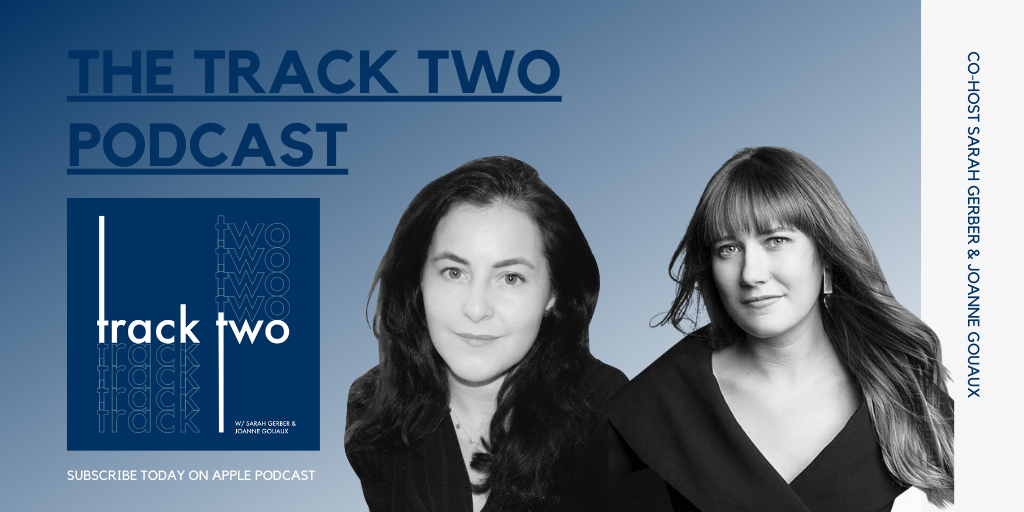Track Two Podcast, hosted by Sarah Gerber and Joanne Gouaux, explores the diverse definition of entrepreneurship through talking to entrepreneurs, activists, philanthropists and social and professional leaders from around the world. As Gerber herself says, their podcast aims to explore “the intersection of entrepreneurship and civil society as a powerful collaboration for systems that will change.” In our modern day society, it is vital to cover these topics and Gerber and Gouaux succeed as catalysts for opening the conversation focused on the next steps humanity needs to take in order to achieve long-term positive change. Each person they interview offers a personal take on the qualities necessary to succeed and collectively construct the foundation for the path to societal improvement.
We’ll be highlighting 10 themes of the podcast over the coming weeks. This week, we’re starting by focusing on the episodes of the podcast that showcase the theme of economic empowerment.
‘Rebrand the Entire Country of Serbia’ with Vukašin Stojkov
In this, the first episode of the podcast, Gerber and Gouaux talk to Vukašin Stojkov about his founding of SEE ICT (Startit), the first tech startup accelerator created in Serbia. Startit has become widely popular throughout Serbia and has even become impactful on an international scale. Founded in 2010, Stojkov created Startit to help provide education, networking and employment opportunities to Serbian youth. But as Stojkov’s success has grown, Startit now works with Google, Microsoft and other large corporations to extend its reach and motivate more people.

Stojkov has been attracted to entrepreneurship since a young age, even though he grew up in a time when private enterprise was criminalized in Serbia. However, he was working against the common culture, and as he says, “where I’m from, your parents have been taught that if you go to a state company, you have a state job for your entire life. You will be safe for your entire life and it’s kind of OK for them to push you in that direction because they want only the best for you.” Risk is ingrained in entrepreneurship, but Stojkov experienced it on a scale unlike that which most entrepreneurs endure.
Stojkov talks about his inspiration for the founding of Startit, the challenges and rewards of entrepreneurship and the economic empowerment that he has found along his journey. In a time of such economic uncertainty, Stojkov’s path helps remind the listener of the different ways people can gain success and economic freedom.
‘The Money to Make Decisions’ with Mayra Orellana-Powell
Mayra Orellana-Powell is the founder of Catracha Coffee Company in Santa Elena, Honduras. A social enterprise and coffee exporter, Catracha began with just 13 producers and has now grown to over 80. Over time, both Orellana-Powell and Catracha have gained recognition, and recently Orellana-Powell was even listed in Forbes as one of the most powerful women in Central America.

Orellana-Powell grew up surrounded by an established trade culture—one that has helped produce the tools she currently uses to create economic relationships. It also serves as an example of how small-scale entrepreneurship can prepare someone for later success in the field. The skills needed to sell and convince others of the worth of her product has proved vital to Orellana-Powell in her life as an entrepreneur. She lists many more examples of how she slowly built up her business and how she found an area in the market that she felt wasn’t being properly served.
‘Pushing the Market’ with Ana Lucia Cepeda Ferrara
Ana Lucia Cepeda Ferrara has worked to change the culture around the workforce with her company, Life Beyond Work. She began her entrepreneurial journey with the founding of Bolsa Rosa, the first company in Latin America to focus on the professional breakdown of feminine talent and work-based innovation. Already, Cepeda Ferrara has helped hundreds of people manage their economic freedom and work lifestyle. She focuses on measuring work and pay based on results rather than hours in the office, a concept called ‘FlexTime.’ Her self-management system allows people to reach their full potential by having the flexibility to encapsulate their needs.
Coming out of college, Cepeda Ferrara realized that the traditional work structure wasn’t appealing to her. She began brainstorming entrepreneurial opportunities while working in HR for a local university. Working in human resources gave her the stability of pay while simultaneously allowing her to help people, making sure employees were taken care of and positively impacting their lives and the lives of their families. However, as she began to focus on creating her own company, she spoke about the singular necessity she needed. She says, “when I started the company, I always said I’m going to create a business that I only need my computer to work with. Like, I don’t need anything, I don’t need a place, I don’t need a factory, I don’t need to invest in any walls, I just need my computer so I can move wherever I want. I’m a really free-spirited person so I need that liberty.” Technology has become an integral part of the workforce, and Cepeda Ferrara has begun to adapt to the privileges it offers faster than most. The economic freedom of being your own boss combined with the independence her partners have in their schedule allows for maximum productivity and success.
‘Radical Collaboration for Societal Wellbeing’ with Raj Joshi
Gerber and Gouaux talk to Raj Joshi about his founding of the B-Team and, most recently, Bridging Ventures. The B-Team, like Bridging Ventures, is a nonprofit global collective of business leaders targeting corporate innovation. Bridging Ventures is an organization management company that focuses on “movements to transform education, redesign our economy, rebalance our planetary impact and restore natural ecosystems.”
Joshi has centered his life around philanthropy, a concept he learned from a young age through stories of his grandfather and family. “When I think back through history, I think ‘gosh, how much might the smallest part of us that is giving send in the ripple through time and create the opportunity for someone to do something that might change the course of history?’” Joshi says. Entrepreneurs, and people all over the world, have a responsibility to create positive change and empower their surrounding community, and it is role models like these that Gerber and Gouaux highlight in their podcast. However, philanthropy comes with its own complications, like the possibility of it becoming politicized or organized by jurisdiction, which ultimately stunts the potential society and companies have to offer. Working within these boundaries as well as breaking them has been a challenge for Joshi, and he asks for people to focus on being good global citizens in tandem with their corporate responsibilities.







